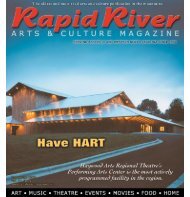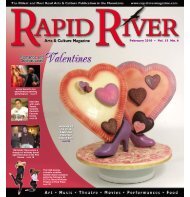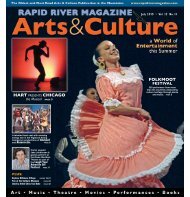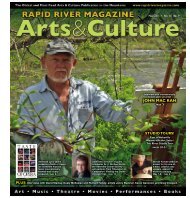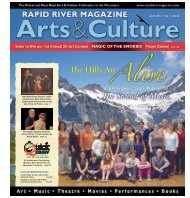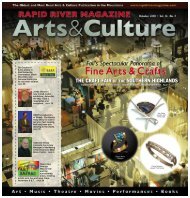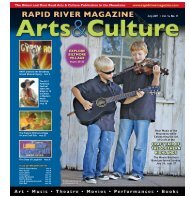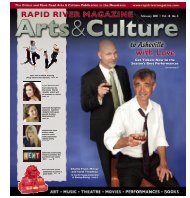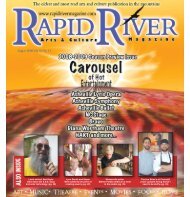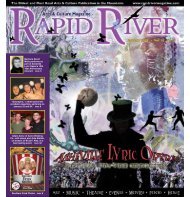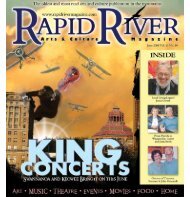JONAS GERARD - Rapid River Magazine
JONAS GERARD - Rapid River Magazine
JONAS GERARD - Rapid River Magazine
Create successful ePaper yourself
Turn your PDF publications into a flip-book with our unique Google optimized e-Paper software.
R A P I D R I V E R A R T S & C U L T U R E M A G A Z I N E<br />
stage preview<br />
PART 1 OF 2: INTERVIEW WITH STELLA ADLER STUDIO OF ACTING’S<br />
Richard Handy and Dusty McKeelan<br />
Richard Handy is a Core Program<br />
instructor at the Stella Adler Studio<br />
of Acting. Voice Instructor, Dusty<br />
McKeelan helps students through an<br />
extensive routine based on an array<br />
of vocal techniques. A course in improvisation<br />
is offered with Handy and McKeelan on<br />
Monday, April 4, from 7 to 9 p.m. Join Dusty<br />
McKeelan on Monday, April 11, for Voice<br />
Instruction from 7 to 9 p.m. Classes are $35.<br />
Call (828) 254-1320 to register.<br />
<strong>Rapid</strong> <strong>River</strong> <strong>Magazine</strong>: How did the Stella<br />
Adler Studio of Acting come to Asheville?<br />
Dusty McKeelan: When my wife and I<br />
decided to leave NYC to be closer to our<br />
families, Tom Oppenheim — the Artistic<br />
Director of the Studio and Stella’s grandson<br />
— asked me to pilot a program for smaller<br />
markets. I met Richard upon my arrival, and<br />
the two of us created the Asheville Studio.<br />
Richard Handy: I came down from NYC a<br />
few years ago for about six months and just<br />
fell in love with the city. I had the ambition<br />
to start an acting program and in that<br />
process discovered Dusty had a similar<br />
ambition. As it turns out we have very<br />
complimentary skill sets and work incredibly<br />
well together. It’s been a complete joy<br />
working with him and ACT.<br />
RRM: Where did you study and with whom?<br />
What is the approach you take to acting?<br />
DMc: I studied at the Stella Adler Studio in<br />
NYC through New York University with<br />
James Tripp, Ron Burrus, Andrew Wade,<br />
Sam Schacht, Frank Langella, Mario Biagini,<br />
and many others. My approach is an amalgamation<br />
of everything I’ve learned. Basically,<br />
I do everything I can to bridge the gap<br />
between myself and the given circumstances<br />
of the character. The preparation required<br />
varies for each role.<br />
INTERVIEWED BY DENNIS RAY<br />
RH: For my core acting technique I studied<br />
primarily with Bill Esper, Freddy Kareman<br />
and Robert X. Modica in NYC for<br />
seven years. All of them taught with Sandy<br />
Meisner for years at the famous Neighborhood<br />
Playhouse with Esper essentially<br />
carrying the torch for the method. I feel<br />
very fortunate to have gotten the opportunity<br />
to work with these, and so many other<br />
extraordinary people.<br />
RRM: When you first meet a student, can<br />
you tell right away if he/she has what it takes<br />
to be an actor?<br />
DMc: I personally choose to believe that everybody<br />
does have what it takes — and in fact<br />
has the right — to be an actor. Some have<br />
more walls than others, and some walls are<br />
more difficult to break down. But in theory,<br />
everyone can act well if they work at it.<br />
RH: You can get a sense for a person, but<br />
I never know and, even months into the<br />
process, it’s difficult to tell because everyone<br />
progresses at a different pace. Some are able<br />
to connect and break down walls quickly<br />
and for others it can take years. What we can<br />
very quickly see is their dedication and work<br />
ethic. Without that, this kind of work is extremely<br />
difficult to do well, if not impossible.<br />
To be a good actor it takes a great sense<br />
of empathy, a strong voice and vulnerable<br />
tension free body. That’s pretty much it and<br />
that’s difficult to see in an interview.<br />
RRM: What are some of the things you teach<br />
actors about the craft of acting?<br />
DMc: We approach two sides of the craft.<br />
I teach from a primarily physical perspec-<br />
tive, offering techniques and<br />
exercises to free the body (the<br />
actor’s instrument) from habitual<br />
functioning and to encourage<br />
more effective ways to breathe,<br />
speak and move. Considering the<br />
act of respiration as a constant<br />
exchange of spirit, the actor learns<br />
to invite the breath (which is the<br />
spirit) as deeply, fully and gently<br />
into the body as possible, and then<br />
to give that breath/spirit away in the form of<br />
language as vulnerably and freely yet also as<br />
strongly as possible.<br />
RH: I teach a Sandy Meisner based approach,<br />
and Meisner has always defined<br />
acting as “the ability to live truthfully under<br />
imaginary circumstances” with Truth and<br />
Imagination being the foundation of that.<br />
Imagination is one of the greatest tools of<br />
an actor and Truth is the life blood of art.<br />
Without it, art dies and makes it virtually<br />
impossible to connect to. In a sense, we<br />
teach people to see and understand their<br />
own truth, to develop their imagination as<br />
a tool, and to rediscover who they really are<br />
underneath years of societal walls.<br />
Through this they learn how to genuinely<br />
connect with themselves, others, their<br />
Dusty McKeelan<br />
Richard Handy<br />
circumstances and the environment around<br />
them. We also teach them that there are no<br />
small moments and likewise no big moments,<br />
only that every moment is important.<br />
Once that foundation is in place we begin to<br />
teach people how to craft well, how to understand<br />
a script, how to apply their foundation<br />
to film, TV, Shakespeare, commercials,<br />
etc. This is done through voice, movement<br />
and technique training.<br />
Learn more when we run part two of this<br />
interview in our May issue!<br />
Stella Adler Studio of Acting, c/o Asheville<br />
Community Theatre, 35 E. Walnut St. For more<br />
information phone (828) 254-1320 or visit<br />
www.stellaadler-asheville.com.<br />
‘Daniel Meyer’ continued from page 8<br />
RRM: What is a typical work day in your life?<br />
DM: It seems that there are no typical days,<br />
since I am balancing the artistic leadership of<br />
two orchestras and a growing guest conducting<br />
schedule.<br />
RRM: Top 5 composers?<br />
DM: How about a top five I would like to get<br />
to know better since I am intrigued by their<br />
music? Vaughan Williams, Janacek, Bartok,<br />
Schumann, and Schutz.<br />
RRM: Any composer’s work you would love<br />
to conduct/perform but for some reason or<br />
another have not?<br />
DM: The list seems to get longer rather<br />
than shorter. I would love to conduct<br />
Beethoven’s Missa Solemnis, Britten’s War<br />
Requiem, Bruckner’s 8th Sympony, Adams’<br />
Harmonielehre, and a host of great operas,<br />
including Berg’s Wozzeck, Strauss’ Der<br />
Rosenkavalier, Mozart’s Cosi fan Tutte, and<br />
Puccini’s Turandot. I am grateful that the<br />
audience in Asheville has a strong sense of<br />
discovery and an appetite for new music,<br />
and I can be creative with what I program.<br />
IF<br />
YOU<br />
GO<br />
The Asheville Symphony<br />
Orchestra presents “Behind the<br />
Notes,” Tuesday, April 12 at 4 p.m.<br />
at the Deerfield Retirement Community<br />
on Hendersonville Road in South Asheville.<br />
Moderated by Chip Kaufmann. For more<br />
information call (828) 254-7046.<br />
Vol. 14, No. 8 — RAPID RIVER ARTS & CULTURE MAGAZINE — April 2011 9



